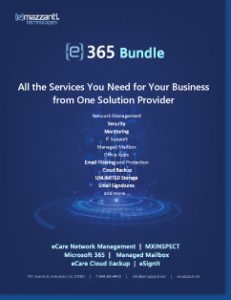|
Need Security Help? Enlist a Partner
Partner benefits “For the most part, organizations have realized that they don’t have the manpower to watch every node on their network 24/7,” says Steve Groom, TIG’s director of security and wireless solutions. According to Groom, outsourcing security and data recovery not only saves money, it allows businesses to have their networks monitored more intelligently than even the best IT in-house employees can accomplish. “Because they work with different companies, [partners] see all kinds of different attacks; internal monitors are always seeing attacks they may not recognize,” Groom says. “Using a [partner] also is about one-third the cost of having one or two IT engineers plus all the monitoring tools you’d need to buy, so customers are starting to understand that it’s cheaper and you get a better level of response. “What do you need? Once you have established a clear understanding of your needs and objectives, it’s time to look for a partner. Finding available partners is easy; virtually all major hardware and software manufacturers link to a partner locator directly from their Web sites. It’s choosing the right partner for your business that is the challenge. Here are some important considerations: Location and staff. Some partners will be geographically closer to you than others. You might consider the role that proximity can play in cultivating a stronger relationship with the partner. Many partner companies will subcontract out the work to be done. Find out if the potential partner will be utilizing their own staff, or if the people working on your account will be subcontracted. Certification. Consider the potential partner’s level of accreditation — check that they are certified in areas of expertise that complement your needs. Major technology solutions providers offer certifications, demonstrating that a partner has the qualifications and knowledge to expertly work with their solutions. While hiring a certified partner may cost a bit more, it may save you in the end. You could end up spending a lot more in time and implementation costs to get up and running if you hire the wrong partner. Certifications also indicate that the partner has a good relationship with the manufacturer, which can mean faster access to experts if needed. Specialties. Operations. Cost. References. Conclusion from Symantec |

Carl Mazzanti is Co-Founder and President of eMazzanti Technologies, Microsoft’s four time Partner of the Year and one of the premier IT consulting services for businesses throughout the New York metropolitan area and internationally. Carl and his company manage over 400 active accounts ranging from professional services firms to high-end global retailers.
eMazzanti is all about delivering powerful, efficient outsourced IT services, such as computer network management and troubleshooting, managed print, PCI DSS compliance, green computing, mobile workforce technology, information security, cloud computing, and business continuity and disaster recovery.
Carl Mazzanti is also a frequent business conference speaker and technology talk show guest and contributor at Microsoft-focused events, including frequent prominent roles at the Microsoft Inspire (Worldwide Partner Conference / WPC).
Carl, a serial Entrepreneur, gives back to the community through Entrepreneur teaching engagements at Georgetown University, the company’s ocean wildlife conservation effort, the Blue Project, and Tree Mazzanti.













